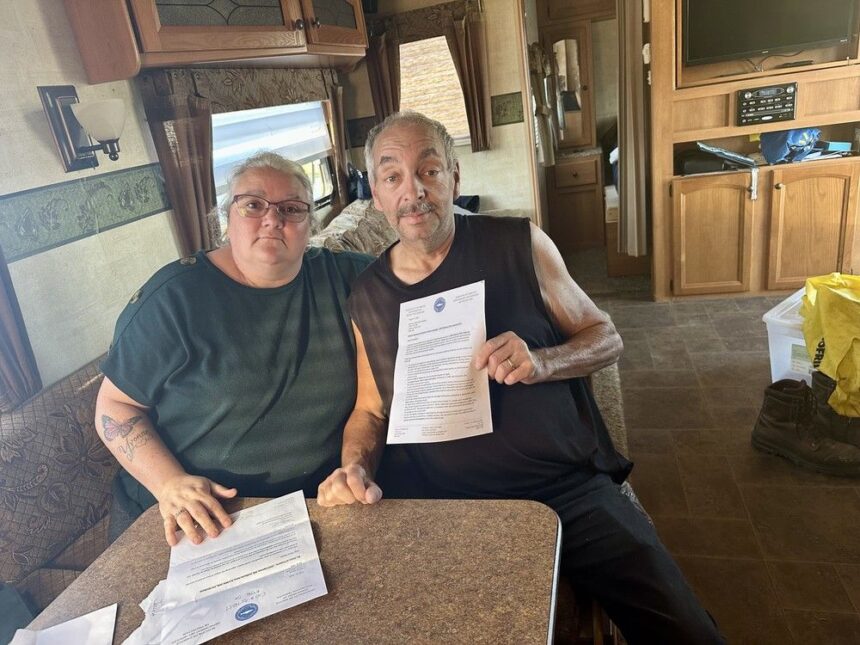Published Sep 10, 2025Last updated 8 hours ago7 minute readSamantha and Perry Muise of Hubbard’s Point, Yarmouth County, have been living in a camper on their property after feeling forced from their home over the winter. They and the Municipality of Argyle disagree on what transpired. TINA COMEAUArticle contentOn the wall inside the cramped camper is a sign that reads Happy Campers. But Perry and Samantha Muise are anything but.THIS CONTENT IS RESERVED FOR SUBSCRIBERS ONLY.Subscribe now to access this story and more:Unlimited access to the website and appExclusive access to premium content, newsletters and podcastsFull access to the e-Edition app, an electronic replica of the print edition that you can share, download and comment onEnjoy insights and behind-the-scenes analysis from our award-winning journalistsSupport local journalists and the next generation of journalistsSUBSCRIBE TO UNLOCK MORE ARTICLES.Subscribe or sign in to your account to continue your reading experience.Unlimited access to the website and appExclusive access to premium content, newsletters and podcastsFull access to the e-Edition app, an electronic replica of the print edition that you can share, download and comment onEnjoy insights and behind-the-scenes analysis from our award-winning journalistsSupport local journalists and the next generation of journalistsRegister to unlock more articles.Create an account or sign in to continue your reading experience.Access additional stories every monthShare your thoughts and join the conversation in our commenting communityGet email updates from your favourite authorsSign In or Create an AccountorArticle contentFrom inside the camper they’ve been living in for a few weeks with their family in Hubbard’s Point, Yarmouth County, the couple stares out the window at their house that sits alongside the camper.Article contentArticle contentThey’d rather be living there.Article contentEven with the camper, they feel homeless.Article contentArticle contentThe couple says circumstances, which they blame the Municipality of Argyle for, led to the situation they’ve been in.Article contentFor its part, the municipality disputes what the couple says happened.Article contentThere was a big sewage backup inside the house in February. This fact both sides agree on.Article contentBut beyond that, there’s disagreement.Article content Perry and Samantha Muise sit inside a camper reading correspondence from the Municipality of Argyle. TINA COMEAUArticle contentWHAT DOES THE COUPLE SAY?Article contentThe couple says in February, a sewer backup happened inside the home. The house is not on a municipal sewer system. It was the property’s own sewer system.Article contentThe couple hired a local business to conduct repair work and a cleanup. The contractor went to the home to do so.Article contentBut the couple also says the municipality’s bylaw enforcement officer/fire inspector showed up at the property and entered the house.Article contentThe couple claims they were told by the municipal official that they couldn’t live in the house because it was condemned.Article contentArticle contentPerry Muise asked what was wrong with the house. He says they were told the foundation was cracking. “Then he told us we had two days to get out,” Samantha says.Article contentThe couple was dismayed, especially since the sewage leak was being cleaned up. They say they’d been told in the past that garbage and metal around the house needed to be cleaned up. But they’d never been told before the house was in dire deteriorating shape.Article contentPerry says the official told his mother, also living in the house, that they all had to leave because it was unsafe to live in the house. He says it was upsetting to her.Article contentSamantha says it felt like they were being forced out.Article content“But we just went by what he said because he’s an enforcement officer. We took his word for it,” she says.Article contentThey stayed at a hotel for two days and found a place in Pubnico to rent. They rented U-Hauls and moved their belongings out of the Hubbard’s Point house. The rent in the place they moved to was $1,500 a month, which created financial strain. At the Hubbard’s Point house they had no payments.Article contentThe couple never received anything in writing from the municipality saying the house was condemned. There was no order affixed to the property.Article contentAfter six months, the couple couldn’t afford rent payments anymore. But they say they couldn’t go back to live inside their house, so they put campers on the property.Article content Perry and Samantha Muise have been living in a camper alongside their home, saying they’d rather be living in their house instead. TINA COMEAUArticle contentBecause they had been told the house was not fit to live in, they disconnected the power and had the meter removed. Why, they say, would they pay for power if no one was allowed to occupy the house? On top of this, when the house was vacant, they say someone broke in and damaged the kitchen.Article contentThe municipality, however, says the house was never condemned and no directive was issued by the municipality requiring them to leave the house. It also indicated this in a letter it wrote to Perry Muise in July when he had inquired about the status of the property. The municipality said there were no orders in place restricting lawful occupation or use of the property.Article contentArticle contentThe couple says the situation has been very difficult, both financially and emotionally.Article contentThey said on Aug. 27 that getting the power reconnected was too costly, due to needed upgrades. And break-in damage also has to be repaired. “Now we’re in campers on the land, with no power and no water,” Samantha says.Article contentShe did say later on that a very kind red seal electrician had reached out to see if they could help with the power situation regarding the home.Article contentBut they’ve still got a long road ahead to get themselves situated again.Article content“We’re in a mess,” Perry says, saying he had a mini-stroke in the spring, which he believes was due to not being able to afford his medication and the stress of the situation.Article contentThey’ve expressed their concerns to the municipality and met with municipal officials.Article content“We got a letter and they’re stating all kinds of stuff,” says Samantha, saying one thing that stands out from the letter states “the property owner chose to leave voluntarily.”Article contentArticle contentThe couple says that’s not true.Article contentThe couple also feels that the municipality is calling them liars.Article contentWHAT DOES THE MUNICIPALITY SAY?Article content“There is certainly a massive misunderstanding here,” says Alain Muise, the municipality’s CAO.Article contentHe says the municipality isn’t calling the couple liars, but the municipality doesn’t share the same version of what took place.Article content“We’ve conducted an investigation internally, actually three separate ones (including with third parties) to be sure that we understood to the best of our knowledge, what happened,” says Muise.Article content Municipality of Argyle’s administrative building. TINA COMEAUArticle contentMuise says the municipality flatly denies that the couple was told the house was condemned, and the municipality also denies other things the couple says occurred, which the couple also outlined in a social media post. For instance, the municipality says that municipal staff was not involved in discussions to encourage the sale of the house or interfere with the property ownership.Article content“They had a very unfortunate (sewage) backup in their property … in the winter this year, and it was bad. We’re aware that at some point, our bylaw enforcement officer did a wellness check on them because there were pieces of wood that were being thrown out. It looked like things were being destroyed. They had had dealings before and unsightly issues in the past,” Muise says. “It wasn’t an unsightly call. It was a courtesy (call).”Article contentMuise says if there is a dangerous or unsightly complaint, a bylaw enforcement officer has the right to go onto a premise and examine.Article content“He was not there for that reason,” says Muise, saying it’s not the typical type of visit a bylaw officer would make, since usually visits stem from complaints. This time there was concern over safety. “From my understanding, it was made out of empathy. But I suspect that the residents may have a different view.”Article contentArticle contentMuise says there is a “significant gap in what we understand (happened), compared to what they’re saying.”Article contentMuise says their municipal employees are trained and aware of the processes that must be followed. He says there are very stringent rules that must be followed before concluding whether a property needs to be condemned. It’s not a determination that can be given verbally.Article content“There’s letters that go out. There’s usually some instruction … you have until this or that to clean it up. It’s usually nine out of the ten times either a dangerous or an unsightly situation,” Muise says. “This was neither of those things. No documentation indicated in any way that it was going to be condemned.”Article contentDISAGREEMENT OVER WHAT FORM HELP SHOULD TAKEArticle contentMuise says the municipality is sympathetic to the family’s situation.Article content“The municipality wants to be able to help them. We’ve offered our loan program under the dangerous and unsightly program. We offered the loan as an opportunity to say, we understand that there may be some repairs that are needed … We wouldn’t be offering a loan if there was in any way, shape, or form evidence that it was condemned. This is to fix the property.”Article contentArticle contentHe says the sewage leak must have been “an awful living situation” for the family, saying, “I wouldn’t want anybody to go through that.”Article contentMuise couldn’t think of any instances in the past where an occupied house has been condemned. Usually, it only occurs with vacant buildings. And again, so people are aware, Muise says a municipal official cannot condemn a home based on a visual inspection. And people must receive something in writing.Article content“Even an engineer wouldn’t be able to do it from a structural perspective … That’s not a reasonable conclusion anyone can make just visually,” says Muise, again saying somewhere along the way, there seems to have been a “massive misunderstanding” in this situation.Article contentBut the couple doesn’t feel like they misunderstood what happened. They say they wouldn’t have left their house otherwise.Article contentThey said on Sept. 9, they were not taking the municipality up on its loan offer.Article content“By us applying for a loan from the municipality, we are saying we were wrong and they were right. We did nothing to deserve any of this. I am not applying for a loan because I have to pay it back,” Samantha says.Article contentThe couple feels instead they should be reimbursed for expenses they’ve incurred, such as hotel, moving, electrical and rental costs.Article contentThe municipality says it doesn’t have grants that cover such expenses, and it can’t get into the process of fixing private homes. “We understand they’re not in a good situation,” says Muise, again referring to the loan programs. “We continue to offer that to them.”Article contentMeanwhile, the Happy Campers sign in the camper remains far from true.Article content The sign says Happy Campers. The Yarmouth County couple is not. TINA COMEAUArticle contentThe couple stresses they did not leave their home voluntarily.Article content“Who in their right mind is going to leave a house that they own to move to Pubnico to pay $1,500 in rent?” says Samantha. “Who in their right mind is going to take a (power) meter off their home unless they’ve been told the house is no good – to be in this misery now that we’re living in a camper?”Article contentAdds Perry, “Why would I want to do something like that?”Article contentDid you think you had to leave your house, he’s asked. “100 per cent,” he says.Article content
Not Happy Campers: Yarmouth County couple and municipality in disagreement over housing situation











